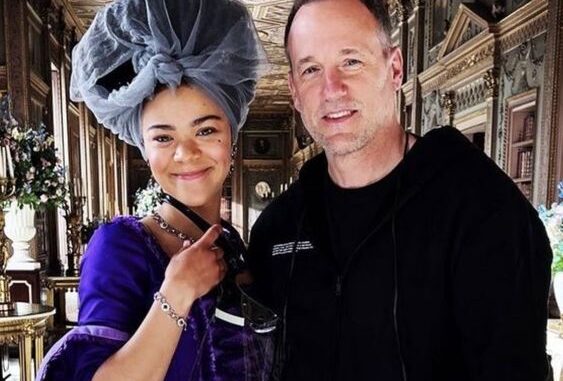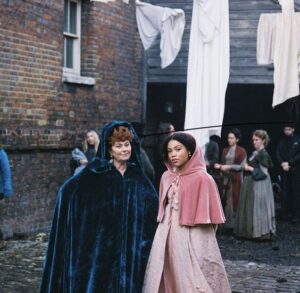
Queen Charlotte: A Bridgerton Story review – a ravishing, romp-packed prequel
Tighten your corsets, ladies. Straighten your waistcoats, gentlemen. Adjust your powdered wigs, anyone who has one. Welcome to the Bridgerton extended universe in the gorgeous six-episode romp from Shondaland, written almost entirely by Rhimes herself, that is Queen Charlotte. Before the action begins, we are given stern guidance by Shonda/Lady Whistledown/Julie Andrews, and when that trinity speaks, you listen. “This is the story of Queen Charlotte from Bridgerton. It is not a history lesson – it is fiction inspired by fact. All liberties taken by the author are quite intentional. Enjoy.”
I do love a pre-emptive strike by a writer, even more so when it is clearly the result of a middle-aged woman having had quite enough of your shit. She might as well have written, “It’s a Regency romance, not an AJP Taylor lecture. Either watch it or go and bring me your dirty clothes so I can put a wash on. God, you treat this place like a hotel.” Eyeroll, credits.There are two timelines, major and minor. The minor is Bridgerton present, in which we meet Queen C and the Ladies Agatha Danbury and Violet Bridgerton as we know and love them (which is to say as Golda Rosheuvel, Adjoa Andoh and Ruth Gemmell). The queen is trying to whip her horde of useless children into shape so that at least one of them can give the family a viable heir. No more mistresses, commoners, Catholics or actresses, she says. Her sons can all gird their loins for legitimate humping with suitable women, and the married daughters can re-consult the diagrams she drew of the marital act and check they’re doing it right. Poor Queen Charlotte. At least the Pomeranians never give her this kind of trouble.
The major timeline is Bridgerton past. Here not-yet-queen Charlotte (India Amarteifio) is 17 and newly promised by her brother Adolphus (Tunji Kasim) to not-yet-mad-but-getting-there King George III (Corey Mylchreest). The fiances’ meet-cute takes place as she is about to hightail it over a palace wall to avoid the wedding. He is as understanding as he is charming (“I am neither a troll nor a beast. Just a George”), and looks like a cross between Nicholas Hoult and Jonathan Rhys Meyers with a soupcon of Tom Cruise thrown in, so she decides to stick around. At first, this appears to be a mistake. George takes off for his observatory as soon as the wedding is over and, to her own and the court’s consternation, doesn’t go near her again until the end of episode two.

The apparently colourblind casting that got a certain sort of person’s knickers in a twist when Bridgerton first graced our screens on that happy Christmas Day three years ago is retconned by Rhimes as the result of “the Great Experiment” performed by the king’s mother, Dowager Princess Augusta (Michelle Fairley, looking icily ravishing in gowns that hopefully make up for being swathed in stinky furs and skins during her murky years in Game of Thrones). To make the new queen feel more at home, Augusta elevates wealthy Black families to the nobility. However, she stops short of supplying them with land or property to go with their new titles, and she cannot force the aristocracy to welcome their new peers into their clubs or issue the invitations to social events that would indicate true equality and acceptance. Among the newly titled is Lady Danbury (Arsema Thomas), who soon becomes Charlotte’s confidante – which is a welcome respite from being porked by her much older and very unlovely husband (“I was having tea, Coral! I was embroidering a pillow! What if he puts another of his GIGANTIC babies inside me?”). Thomas’s comic chops and her chemistry with her maid Coral (Peyvand Sadeghian) is one of the many highlights of this series.
Another is the growing emotional heft of the thing, particularly in the friendship between present-day Lady Agatha and Lady Violet as loneliness presses in and they realise they are still worthy of consideration as they get older – even if society’s attention is on the young. “We are untold stories,” says Agatha, stoking the hope that she is speaking for Rhimes, and we can look forward to Bridgerton: The Menopause Years as soon as humanly possible.
Queen Charlotte also does a fine job of depicting George’s growing mental suffering. Dealing compassionately with the king’s descent into insanity without overwhelming the essential lightness and joy of Bridgerton is a tricky manoeuvre, but it is managed with aplomb.
The series is a rare exception to the rule of prequels (generally substantially worse than the originals and undermining all previous endeavours) and will hopefully set many of its younger stars on the road to success. Amarteifio does especially well, shouldering the bulk of the show’s burdens and showing in embryo all of the Charlotte we know. But it’s with an innocent energy and unjaded intelligence that shows us something new too.